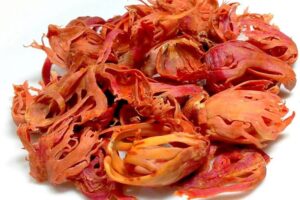Ginger Trade: Kerala's Fiery Root
Kerala, a cornerstone of India’s spice industry, plays a crucial role in the cultivation and export of ginger. Known for its bold flavor, pungent aroma, and medicinal properties, ginger holds a prominent place in Kerala’s agricultural landscape and contributes significantly to the global spice market.
The Kerala Advantage
The fertile soils and tropical climate of Kerala provide ideal conditions for ginger cultivation. Kerala’s ginger is known for its potent aroma, rich oil content, and distinctive spiciness, making it a preferred ingredient for culinary, pharmaceutical, and cosmetic applications worldwide.
Farmers in Kerala employ organic and traditional farming methods, ensuring high-quality yields that meet international standards. This commitment to sustainable practices enhances soil health and supports long-term productivity.
The Historical Significance of Ginger
Ginger has been an essential part of Kerala’s spice trade for centuries. Ancient Indian texts and Ayurvedic scriptures document the use of ginger as a culinary spice and medicinal herb. Ginger’s ability to add flavor, preserve food, and heal ailments made it highly valuable along historic spice routes.
Global Demand and Export
Ginger’s global popularity continues to rise due to its versatile applications and health benefits. It is widely used in food, beverages, herbal remedies, and beauty products.
Kerala’s ginger is exported to major markets across Asia, Europe, North America, and the Middle East. With increasing consumer awareness of natural and organic products, Kerala’s organically grown ginger is gaining traction, positioning the state as a premium supplier in the global spice trade.
Health and Economic Benefits
Ginger is celebrated for its numerous health benefits, including anti-inflammatory, antioxidant, and digestive properties. It is known to alleviate nausea, reduce muscle pain, and support immune health. Ginger is also a key ingredient in traditional medicine for treating colds, respiratory issues, and gastrointestinal discomfort.
Economically, ginger cultivation supports thousands of smallholder farmers in Kerala, providing them with steady incomes and boosting rural economies. The growing demand for ginger ensures stable prices and strengthens the state’s agricultural sector.
Sustainable and Ethical Practices
Kerala’s ginger farmers are adopting organic and eco-friendly farming practices, reducing the reliance on chemical fertilizers and pesticides. These sustainable methods help preserve biodiversity and ensure the production of high-quality, chemical-free ginger.
Fair trade initiatives further empower local farmers by ensuring equitable wages and promoting ethical labor practices. These initiatives enhance Kerala’s global reputation as a producer of high-value, responsibly cultivated ginger.
Trade Opportunities
Ginger offers significant opportunities for importers and exporters aiming to expand their spice portfolios. Kerala’s advanced spice trade infrastructure, government support, and established supply chains make it easy for businesses to source premium-quality ginger directly from trusted producers.
With the increasing global demand for health-boosting spices, investing in Kerala’s ginger trade presents promising returns. Building partnerships with local farmers and cooperatives ensures consistent supply and long-term business growth.
Conclusion
Kerala’s ginger, known for its potency and quality, continues to thrive in the international spice market. As demand for natural, organic spices rises, traders can capitalize on Kerala’s rich spice heritage. By supporting sustainable farming and ethical trade, Kerala’s ginger trade is poised for growth, reinforcing its position as a vital player in the global spice industry.




